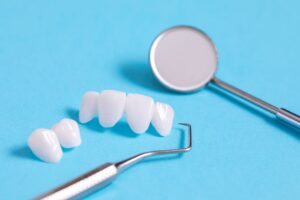
Having aesthetic flaws in your teeth, like stains, chips, cracks, or minor gaps, can leave you feeling anxious about your smile. Fortunately, your dentist can mask aesthetic issues with dental veneers! These thin, porcelain covers are bonded to the front of your teeth to hide imperfections, but they do take some time to create. You will most likely be fitted with a temporary set until the permanent ones arrive from the dental lab in a few weeks.
If you’re unsure why these short-term shells are necessary, continue reading to learn more about why they’re placed and how they help you!
Why Must I Wear Temporary Veneers?
Although veneers are thin, they do require that some of your enamel be removed so they align correctly against your gums. This step ensures that they won’t appear overly bulky in comparison to your natural teeth. Once your dentist carefully strips a thin layer, they’ll take the necessary impressions that will be sent to the lab to create your permanent veneers.
However, because it takes the lab a few weeks to build them, your teeth will need protection. Enamel is their natural defense, and once it’s thinned, they’re more vulnerable to injury. You wouldn’t want to crack or break one while waiting for your cosmetics to arrive. Plus, harmful bacteria are more likely to cause plaque buildup that contributes to cavities and gum disease.
Your dentist can safeguard your teeth in the meantime with temporary veneers.
What Should I Expect from Temporary Veneers?
You’ll need to make a few slight adjustments to your daily habits to accommodate this interim solution. You can anticipate:
- Changes to your dental routine. Since there are usually no spaces between these prosthetics, you’ll probably be unable to floss until your permanent veneers are placed.
- Challenges chewing. These provisional pieces are somewhat thicker than your permanent ones will be, so you might notice some difficulty or mild discomfort chewing.
- Dietary restrictions. Certain foods that are overly hard, chewy, sticky, or crunchy can dislodge these transitory tooth covers.
- Sensitivity. Because your enamel is thinner, you’re more likely to experience some discomfort when exposing your teeth to anything that’s overly hot or cold.
It may take a few days to adjust to your temporary veneers, but it’s worth it to keep your smile safe until your permanent ones arrive. Once you’ve grown accustomed to them in your mouth, you should have a smooth transition once the final product is in place!
About the Author
Dr. Nicholas Rowley has over a decade of experience offering a wide array of services to patients of all ages. He graduated cum laude from Florida State University in 2005 and then earned his Doctor of Dental Medicine at Nova Southeastern University. Now, he’s a member of several professional dental organizations, including the American Dental Association, so you know your grin is in good hands. At his practice, you’ll enjoy a comfortable atmosphere paired with state-of-the-art equipment for the most up-to-date treatments. If you’re interested in veneers and would like a consultation, you can request an appointment on the website or by calling (321) 723-1772.
